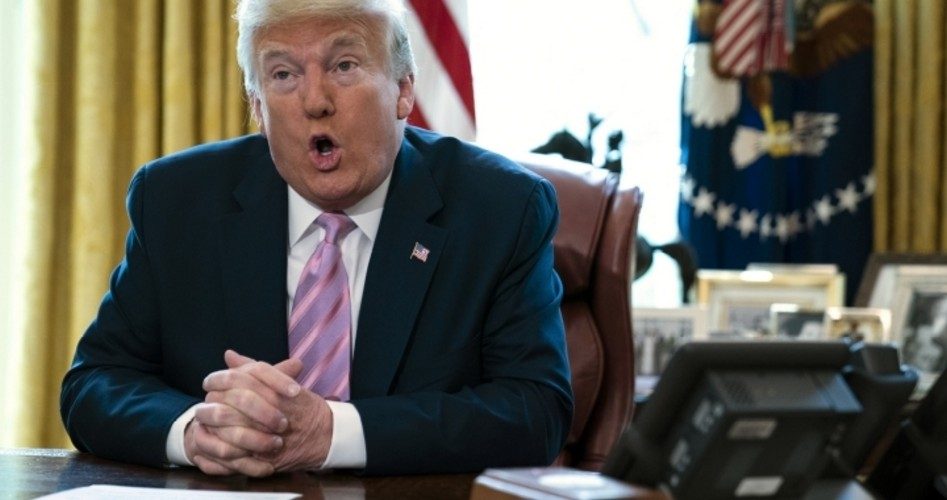
Following the announcement that 23 oil-producing nations had formally agreed to cut world production of crude oil by 10 percent, Daniel Yergin, energy expert, author, and vice-chairman at IHS Markit, said this of President Trump: “Of all the deals he’s done in his life, this has to be the biggest and most complex. He had to be not only dealmaker but also divorce mediator.”
It took four days of intense virtual meetings and negotiations with leaders of the nations making up the OPEC cartel, plus Russia and Mexico, to get the deal done. In deal’s final form, global production of crude oil will officially be cut by 9.7 million barrels a day starting May 1. After two months, the cut will drop to 7.7 million bpd until January, and drop further to 5.8 million bpd for another 16 months.
The real cut will approach 20 percent of world production, reflecting the fact that many oil-producing nations are already suffering cuts due to the global shutdown in response to the COVID-19/coronavirus threat.
The president tweeted:
The big Oil Deal with OPEC Plus is done. This will save hundreds of thousands of energy jobs in the United States.
I would like to thank and congratulate President Putin of Russia and King Salman of Saudi Arabia. I just spoke to them from the Oval Office. Great deal for all!
This brings to mind rule number one from Trump’s 1987 bestseller Trump: The Art of the Deal: Make sure that everyone wins, and make a big deal about it.
In Riyadh, Saudi Arabia’s energy minister said the agreement resurrected OPEC from oblivion: “We have demonstrated that OPEC+ is up, running and alive. I’m more than happy.”
Mexico was brought back into the OPEC fold after seriously considering leaving the cartel in response to a resurgence of populism that recently elected its president. Initially Mexico was asked to cut its production by 400,000 barrels per day. But when President Andrés Manuel López Obrador, commonly referred to as AMLO, balked, President Trump negotiated a compromise: You cut 100,000 bpd, and we’ll cut the other 300,000.
Trump knew the desperate straits the U.S. shale industry was in. Rig counts were down by nearly a third and thousands of workers had already been laid off. Big Oil (Chevron, Exxon Mobil, Royal Dutch Shell, and others) had already announced massive cuts to their capex budgets. If oil dropped into single digits, survival of the industry would be threatened, to say nothing of the impact such devastation would have on the president’s reelection chances in November.
Trump also knew the U.S. production cuts were already coming, so he negotiated without having to apply pressure from the Oval Office to the frackers.
Trump acted as a “divorce mediator” as noted by Yergin. In early March, after Russian delegates walked out of an OPEC meeting, Saudi’s prince MBS (Mohammed bin Salman) retaliated by turning up the spigot of Aramco, the country’s energy producer. He cut the price of crude in half to his best customers, driving the world price of crude to below $30 a barrel. Observers were predicting that the price war, if continued, would cause the price to drop to single digits.
But the marathon of calls and virtual meetings brought the disaffected parties together. Trump offered them what they could not, or would not, obtain on their own: crude oil prices high enough to keep them from going bankrupt. Russia needs oil at $40 a barrel, while the Saudis need $80 a barrel.
MBS’s position was perhaps the most precarious. The sale of part of his most precious asset, Aramco, had netted him far less than the $100 billion he claims he needs to diversity his county’s economy away from its near-total dependence on oil. As a result, he has seen his foreign reserves dwindle away, and has had to set up credit lines with international banking firms in order to keep his welfare state afloat.
Ed Morse, the head of commodities research for Citigroup, called Trump’s efforts “unprecedented”: “Unprecedented measures for unprecedented times. Unprecedented in historical discussions of production cuts, the U.S. played a critical role in brokering between Saudi Arabia and Russia for the new OPEC+ accord.”
The biggest winner is President Trump. As Fortune expressed it, “There has been a tectonic shift in global oil politics. Putin, MBS and Trump — the leaders of the world’s three largest producers — now are dictating global petroleum supply.”
Trump even won plaudits from his enemies. Jason Bordoff, a former energy advisor to President Barack Obama, told Politico, “Coming out of this price collapse, whenever we’re able to restart the global economy, I think we’ll see a shale industry that is more consolidated, growing — albeit more slowly than before — and on balance stronger than before.”
Trump applied his rules from The Art of the Deal in this most difficult of circumstances. The man is indefatigable. He makes at least a dozen meetings every day and at least 50 phone calls. He starts early and works late, often taking calls up until midnight.
He has smart people advising him, but engages the leaders face to face. From his book: “When it comes to making smart decisions, the most distinguished committee working with the highest paid consultants doesn’t hold a candle to a group of guys with a reasonable amount of common sense — and a lot of money on the line.”
And he had leverage. He knew that Saudi’s prince is heavily reliant on the United States for military assistance. He knew that the prince is fearful of tariffs on his oil. He knew that the prince had learned that Senator Kevin Cramer (R-N.D.) had suggested that the president cut off military aid to his country. He no doubt knew that Trump supporter and shale oil magnate Harold Hamm had recommended raising tariffs. Trump knew he knew, and didn’t have to use those threats. They remained unspoken during the negotiations.
Everybody won, including President Trump, who tweeted early Monday morning: “Having been involved in the negotiations, to put it mildly, the number that OPEC+ is looking to cut is 20 Million Barrels a day, not the 10 Million that is generally being reported. If anything near this happens, and the World gets back to business from the Covid 19 disaster, the Energy Industry will be strong again, far faster than currently anticipated.”
And then he offered his praise and congratulations: “Thank you to all of those who worked with me on getting this very big business back on track, in particular Russia and Saudi Arabia.”
Photo: AP Images
An Ivy League graduate and former investment advisor, Bob is a regular contributor to The New American, writing primarily on economics and politics. He can be reached at [email protected].



